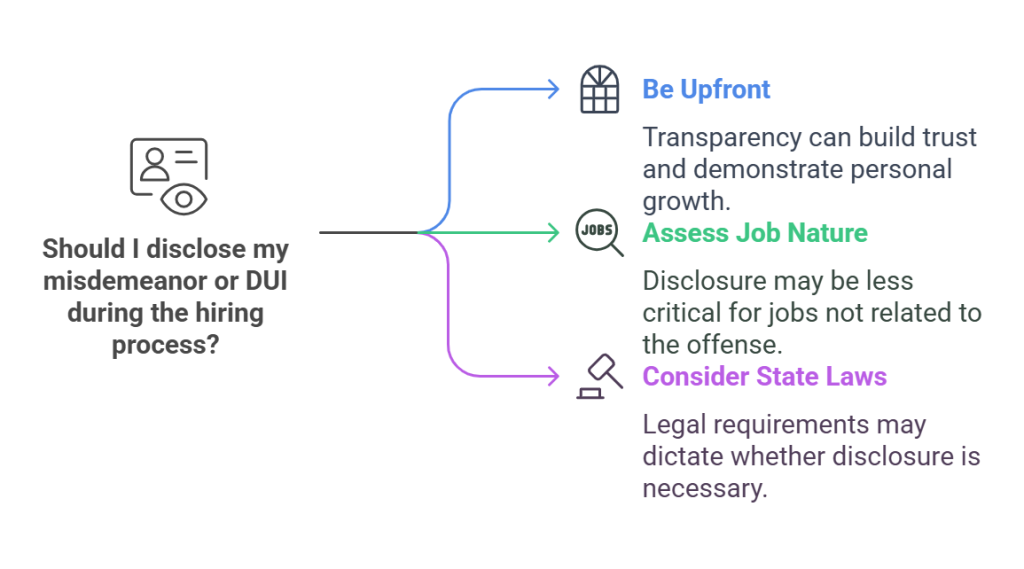In today's competitive job market, understanding the nuances of disclosing past offenses during the hiring process is pivotal. This article aims to shed light on a common question: "Do I have to disclose a misdemeanor after 7 years?" We will delve into the intricacies of background checks, legal obligations, and best practices for both employers and job seekers across various industries such as staffing agencies, healthcare, transportation, tenant screening, non-profit, retail, technology, and hospitality.
Key Takeaways
- Background checks are essential for both job seekers and employers, balancing the need for workplace safety with the opportunity for second chances.
- The seven-year rule for disclosing misdemeanors and DUIs varies by state, requiring a careful understanding of local laws and regulations.
- Employers must avoid blanket hiring policies, conduct individualized assessments to ensure fairness as advised by the EEOC.
- Non-profits and small businesses face unique challenges with background checks, balancing thoroughness with limited resources and legal compliance.
- Technological advancements and evolving legislation are shaping the future of background checks, emphasizing the need for transparency and data protection.
Introduction
LetâÂÂs be honest: background checks can make even the most composed job seeker break into a cold sweat. For employers, it's a balancing act between due diligence and second chances. Uncertainty looms on both sides of the hiring tableâÂÂshould one disclose everything? What do employers even look for? In today's digital-age job market, where a simple click can unravel years of personal history, understanding background checks isnâÂÂt just beneficial; it's essential.
Background checks are often seen as a necessary evil, ensuring workplace safety and integrity. They can involve everything from criminal history to credit scores, becoming a crucial step in the recruitment process. But beyond the basics, there's much ambiguity around the specifics of what's required, especially when it comes to offenses that date back more than a few years.
This article dives into the gray area surrounding the "seven-year rule" for disclosing misdemeanors and DUIs. This guide clarifies legal timelines, state law variations, and practical advice for applicants and employers. It provides the insights needed to approach disclosure with confidence and compliance during job applications and screenings.

The Legal Landscape of Disclosure
When disclosing misdemeanors and DUIs, timing is important. Many states follow a seven-year rule, meaning offenses may not need to be reported on background checks after this period. However, this rule varies by state. So it's essential to understand the regulations in your area or where youâÂÂre seeking employment. Thus, consulting state-specific legislation is vital to accurately gauge your disclosure obligations.
The Equal Employment Opportunity Commission (EEOC) provides guidelines that further muddy the waters. This is because they prohibit employers from adopting blanket policies about disregarding applicants with past offenses. In fact, the EEOC encourages a more individualized assessment. Employers need to take into account the nature of the crime, its relevance to the job, and the time elapsed since its occurrence. Thus, while the seven-year mark might seem like a threshold, the reality may demand a nuanced understanding and approach.
"Disposition" refers to the final outcome of a criminal charge, such as a conviction, acquittal, or dismissal. Recording dispositions in background checks is crucial. It determines the information disclosed during screenings and whether disclosure is needed after several years.
Navigating the legal landscape of misdemeanors and DUIs thus requires a careful review of both federal guidelines and state laws. Ensuring that both job seekers and employers are compliant while also fair and informed.
This article delves into the policies and requirements surrounding the disclosure of misdemeanors and Driving Under the Influence (DUI) offenses. For employers and HR professionals, understanding federal and state regulations is crucial. The same applies to job seekers. With the technicalities out of the way, itâÂÂs important to emphasize transparency. Transparency, from both sides, during interview conversations is essential. As candidates often look for employers who prioritize equal employment opportunities and foster a culture of belonging, so do employers prefer to avoid unexpected findings. As HR leaders, itâÂÂs our duty to humanize the hiring process, offering candidates second chances. -
Background Checks: A Deep Dive
Background checks are a staple of the hiring process, and understanding their nuances is crucial for both employers and job seekers. First, letâÂÂs break down the main types of background checks: criminal, credit, and employment history. Employers conduct criminal background checks to unearth any legal issues, which can include misdemeanors or DUIs, sometimes dating as far back as state law allows. Credit checks, more common in finance-related jobs, unveil potential financial irresponsibility. Employment history checks confirm past job roles and durations to ensure applicantsâ resumes match reality.
When it comes to dismissed charges, like a DUI that didnâÂÂt stick, there's a grey area. They might still appear on a background check, causing undue concern. It's essential for employers to dig deeper into what these charges mean rather than making snap judgments. Conversely, job seekers need to be prepared to clarify such entries on their records.
The mechanics of background checks involve various sophisticated processes. An SSN trace can reveal an applicant's address history, while drug mouth swabs provide recent drug use information. These checks ensure a thorough review, but they require careful navigation to avoid privacy infringements.
Each industry has its specificities when it comes to background checks. Healthcare employers might prioritize checks for past convictions that highlight trustworthiness and patient safety. In contrast, transportation sectors focus on driving records alongside criminal checks. Staffing agencies often conduct broader checks to cater to diverse client needs. Understanding these nuances helps both employers and job seekers align expectations and minimize surprises during the hiring process.
Disclosure Requirements
When it comes to disclosing misdemeanors or DUIs, timing and context matter. Generally, it's a good idea for applicants to be upfront about their past offenses. This is true especially if they're asked directly during the hiring process. However, the need for disclosure can depend on various factors, such as the nature of the job and relevant state laws. One effective approach is to focus on transparency while also framing how you've moved forward since the offense.
Employers value honesty and integrity, and addressing past mistakes with openness can build trust. This is your chance to explain any lessons learned and how you've grown, which can turn a potential red flag into a positive story of personal development. Remember, everyone has a past, and how you present your journey can make a significant difference in the hiring decision. Embracing a growth mindset can demonstrate your ability to learn from experiences, adapt, and improve, which is highly valued in any professional setting.

Best Practices
From an employerâÂÂs perspective, being consistent in how you handle disclosed information is key. It's important to follow a standardized process that complies with EEOC guidelines. That is, treating all applicants fairly and evaluating each case individually. Employers should consider the nature of the offense, its relevance to the position, and the time elapsed since the incident. This balanced approach helps in making fair hiring decisions and maintaining a positive company image.
Balancing transparency with privacy is crucial. Applicants should strive to be honest without oversharing. While employers should respect privacy by not probing unnecessarily into areas not relevant to the job. Both parties must navigate this delicate terrain with mutual respect and understanding, ultimately building a foundation of trust.
Industry-specific Concerns
Non-Profit
When it comes to background checks, non-profits and small businesses often navigate a distinct set of challenges compared to larger organizations. For non-profits, the focus is usually on ensuring a safe environment for their often vulnerable client base. This means background checks are crucial, and they might be tailored to spotlight any history of abuse or serious offenses that could potentially impact the trust such organizations depend on. However, non-profits may have limited resources and budgets for extensive checks, which necessitates balancing thoroughness with practicality. Leveraging volunteer networks or affordable online platforms may offer cost-effective solutions.
Small Businesses
Small businesses, on the other hand, face their own set of hurdles. With limited staff, these businesses often lack dedicated HR personnel skilled in conducting comprehensive background checks. This can sometimes lead to inconsistent screening practices or reliance on less thorough checking methods. Small businesses may face higher litigation risks if background checks miss important information or are seen as intrusive. To minimize these risks, they should use standardized procedures and consider outsourcing to specialized agencies that meet their industry needs.
Ultimately, for both non-profits and small businesses, the key lies in instituting clear policies that balance the necessity of background checks with respect for privacy and legal compliance. They must also stay informed about state-specific regulations that could affect how they approach this sensitive area. Making informed, consistent decisions helps protect their interests while safeguarding the communities they serve or their enterprise's integrity.
Future Outlook
Trends
As the landscape of employment evolves, so do the methods and technologies behind background checks. One major trend is the integration of advanced technology such as artificial intelligence and machine learning. These streamline the background check process, making it quicker and more accurate. These technologies are reducing the time it takes to verify an individual's history, providing instant access to vast amounts of data. In addition, it is key in helping to identify patterns that may not be immediately apparent through traditional checks. This presents opportunities for more thorough assessments but also raises concerns about data privacy and the potential for over-reliance on algorithms, which can inadvertently perpetuate biases.
Developments
On the legislative front, there's an increasing push towards "ban the box" laws and fair chance hiring practices across numerous states. These initiatives are aimed at delaying inquiries into criminal history until later in the hiring process, giving candidates a fair shot at demonstrating their qualifications before potential biases come into play. Additionally, data privacy laws are steadily tightening; the General Data Protection Regulation (GDPR) in Europe has already impacted how data is gathered and stored, and similar trends are emerging in the U.S. These changes indicate a future where both transparency in data usage and the protection of individual rights are prioritized. Employers and job seekers alike must stay informed and adaptable, ensuring compliance and preparation for these evolving norms.
Frequently Asked Questions (FAQ)
Will a DUI come up on a background check after 7 years?
It depends. Much like cleaning a whiteboard, sometimes the scribble doesn't entirely vanish. Depending on state laws and the type of background check, a DUI may still pop up, especially in certain industries like healthcare or transportation where detailed checks are the norm. However, many consumer reporting agencies adhere to the seven-year rule, so it may not be reported if your state restricts this.
What does "disposition" mean on a background check?
"Disposition" refers to the final outcome of a criminal charge. Think of it as the "here's what happened" after a legal skirmish. Was the charge dismissed, reduced, or did it lead to a conviction? This status forms a crucial piece of the puzzle when employers interpret background checks.
Are employers obligated to consider misdemeanors in hiring decisions?
Employers are legally bound to weigh their options thoughtfully. Considering factors like the nature of the job and the time elapsed since the misdemeanor is important. The Equal Employment Opportunity Commission advises against blanket bans based solely on criminal records.
Do non-disclosures impact small businesses differently than larger enterprises?
Small businesses often dance on a tightrope when handling non-disclosures. They may lack the resources for exhaustive legal vetting. Which risks either a hire with potential liability or missing out on a good candidate due to overly cautious stances. Larger enterprises, with more robust HR departments, might navigate these waters with greater clarity and confidence.
Conclusion
In wrapping up the complex topic of misdemeanor and DUI disclosure after seven years, a few key points come into focus. While the general guideline suggests that such offenses may not need to be disclosed after this period, it's crucial to be mindful of state-specific regulation. Understanding the type of background checks relevant to your targeted industry can also shape how both applicants and employers handle this sensitive information.
For job seekers, a proactive approach in managing your past is vital. While balancing transparency with privacy, being informed and prepared about your legal obligations can help you navigate potential pitfalls confidently. On the employer's side, staying compliant with legal frameworks, such as those recommended by the EEOC, ensures that hiring processes remain fair and just.
As the landscape of background checks continues to evolve, both technological advancements and legislative changes are on the horizon. Keeping abreast of these trends will arm you with the tools needed to manage disclosures effectively in the future. For additional resources and guidance, visit the GCheck blog. The GCheck blog delves deeper into the intricacies of background checks and offer practical solutions tailored to your needs.
Additional Resources
- Do I Have to Disclose a Misdemeanor After 7 Years? Legal Insights
- How Can a Misdemeanor Charge Affect Employment?
- Do You Have to Disclose a Misdemeanor After 7 Years? Legal Guidelines
- Will a DUI Come Up on a Background Check? What You Need to Know
- Will a DUI Show on a Background Check? Legal and Employment Implications

GCheck Editorial Team
Meet the GCheck Editorial Team, your trusted source for insightful and up-to-date information in the world of employment background checks. Committed to delivering the latest trends, best practices, and industry insights, our team is dedicated to keeping you informed.
With a passion for ensuring accuracy, compliance, and efficiency in background screening, we are your go-to experts in the field. Stay tuned for our comprehensive articles, guides, and analysis, designed to empower businesses and individuals with the knowledge they need to make informed decisions.
At GCheck, we're here to guide you through the complexities of background checks, every step of the way.






